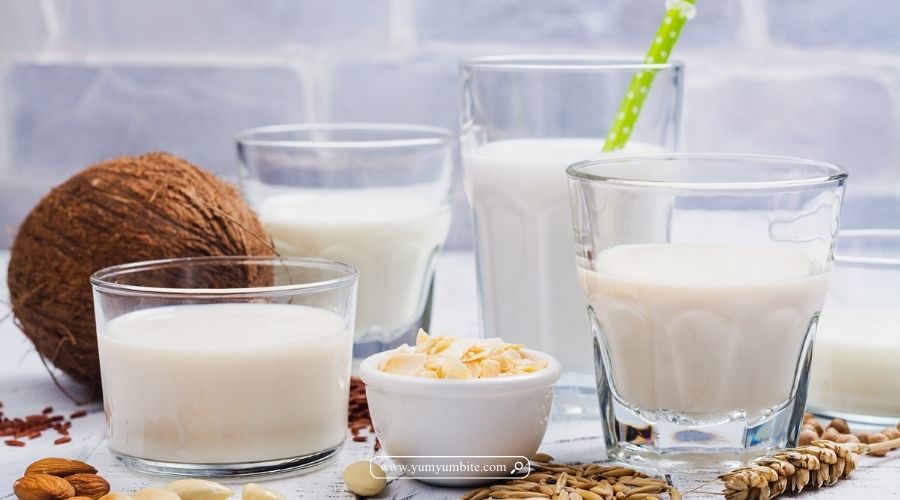In recent years, the demand for non-dairy milk substitutes has skyrocketed, fueled by growing awareness of dietary preferences, lactose intolerance, and the environmental impact of dairy farming.
Whether you’re vegan, lactose-intolerant, or simply seeking a healthier alternative, non-dairy milk has evolved into a delicious and nutrient-packed choice for all.
From the creamy richness of oat milk to the protein power of soy, the options available today go far beyond traditional dairy.
This guide dives deep into 15+ of the best non-dairy milk substitutes, each offering unique flavors, textures, and nutritional benefits.
Whether you’re looking for a plant-based option for your morning coffee, a protein-packed substitute for your smoothies, or a creamy addition to your baked goods, this article will help you find the perfect match.
15+ Best Non-Dairy Milk Substitute to Satisfy Every Taste and Dietary Need
Choosing the best non-dairy milk substitute doesn’t have to be overwhelming. With so many incredible options available today, there’s a milk alternative for every taste, recipe, and dietary need.
Whether you’re looking for the nutty richness of almond milk, the frothability of oat milk for your coffee, or the high protein content of soy milk, the variety ensures that your dairy-free journey can be both delicious and nutritious.
Almond Milk
Almond milk is one of the most popular non-dairy substitutes, thanks to its light and slightly nutty flavor. It’s a great alternative for those who are lactose intolerant or vegan, offering a lower-calorie option compared to cow’s milk.
Almond milk is rich in vitamin E and contains fewer sugars, making it ideal for those looking to reduce their calorie or sugar intake.
However, caution should be taken if you’re allergic to nuts, as almond milk could trigger reactions. It also has a thinner consistency, which may not work well in recipes requiring thicker milk, such as creamy sauces or puddings.
Almond milk is best suited for smoothies, cereals, and baking where a light, neutral milk alternative is needed.
Oat Milk
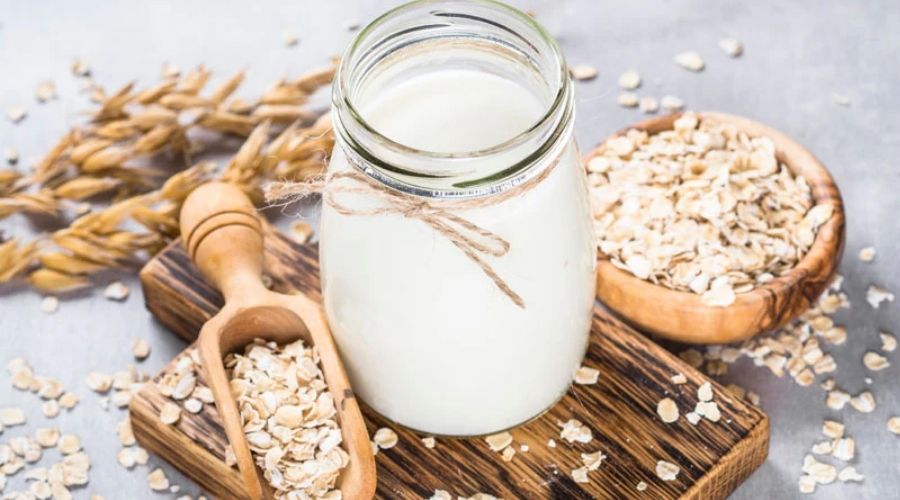
Oat milk has grown in popularity due to its creamy texture and mild, slightly sweet flavor. It closely mimics the consistency of cow’s milk, making it an excellent substitute for lattes, soups, and creamy sauces.
Oat milk is high in fiber and contains beta-glucans, which can help lower cholesterol levels. For those with nut allergies, it’s a great option as it is nut-free.
However, oat milk tends to have higher carbohydrate content, so individuals managing their carb intake should be mindful of that.
It’s a fantastic choice for making frothy coffee drinks, dairy-free desserts, or as a direct replacement in most savory dishes requiring milk.
Coconut Milk
Coconut milk is a flavorful and rich substitute for dairy milk, often used in both sweet and savory recipes. Its naturally creamy texture makes it perfect for curries, soups, and even dairy-free ice cream. It also adds a tropical flavor, making it a popular choice in Asian or Caribbean-inspired dishes.
Be cautious, though, as coconut milk is high in fat, particularly saturated fat, which may not be suitable for those watching their fat intake.
Additionally, its strong flavor can sometimes overpower delicate dishes, so it’s best used when a hint of coconut enhances rather than dominates the recipe.
Coconut milk is perfect for creamy soups, dairy-free baked goods, and rich sauces.
Also Read: 15+ Best Cayenne Pepper Sauce Substitutes to Spice Up Your Meals!
Soy Milk
Soy milk is one of the most widely available and versatile non-dairy milk substitutes. It’s a protein-rich option that closely mimics cow’s milk in both texture and nutritional content, making it ideal for those seeking a higher protein alternative.
Soy milk is made from soybeans and is often fortified with calcium, vitamin D, and vitamin B12, which makes it a great option for vegans. However, some individuals may experience digestive discomfort or allergic reactions to soy.
It can also have a slightly bean-like aftertaste, which may not be appealing in some recipes.
Soy milk works well in coffee, smoothies, and creamy dishes like sauces or casseroles, where a rich, neutral milk is required.
Rice Milk
Rice milk is a lighter and more hypoallergenic alternative to dairy, making it a suitable option for individuals with nut, soy, or gluten allergies. It has a naturally sweet flavor and a watery consistency, which can work well in desserts or cereals.
However, rice milk is lower in protein and may not provide the same nutritional benefits as other non-dairy options.
Its high carbohydrate content also makes it less ideal for those watching their sugar intake.
Rice milk doesn’t thicken well, so it’s not the best option for recipes that need a creamy texture, but it can be used effectively in light soups, baked goods, or as a milk replacement in breakfast dishes like oatmeal.
Cashew Milk
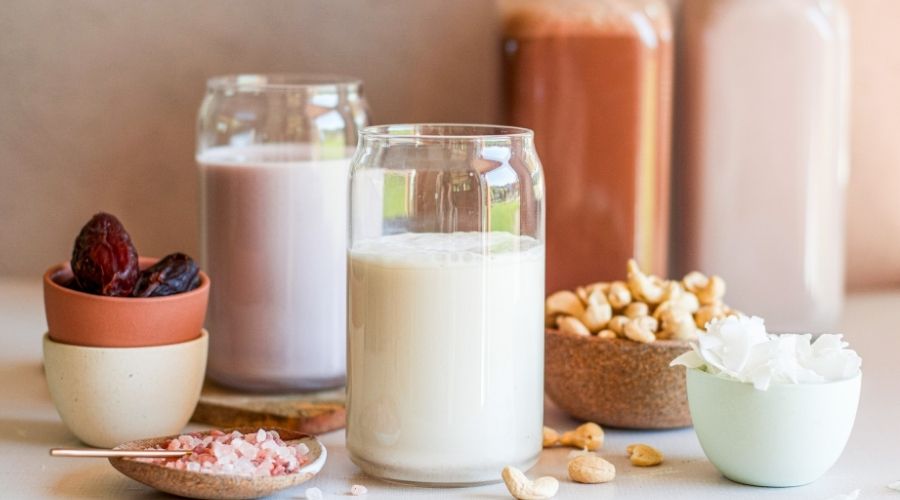
Cashew milk offers a creamy, rich texture that makes it an excellent substitute for dairy in both sweet and savory dishes. It has a mild, slightly nutty flavor that complements a variety of recipes without being overpowering.
Cashew milk is lower in calories compared to cow’s milk and offers healthy fats, but it is also lower in protein. Those with nut allergies should avoid this option, as cashews can trigger reactions.
Cashew milk blends well in creamy soups, sauces, and smoothies, and its thicker consistency makes it a good choice for vegan ice creams or dairy-free mashed potatoes. It’s a great choice when you need a rich, indulgent dairy alternative.
Hemp Milk
Hemp milk is an increasingly popular non-dairy substitute made from hemp seeds. It’s a great source of plant-based protein, containing all nine essential amino acids, along with omega-3 and omega-6 fatty acids, making it a highly nutritious option.
Hemp milk has a slightly nutty, earthy flavor and a creamy texture, which works well in a variety of recipes. However, its taste can be strong for some, so it may not suit every palate.
It’s also lower in calcium unless fortified. Hemp milk is ideal for smoothies, lattes, or savory recipes like creamy soups and sauces, where its rich texture can shine.
Also Read: 12+ Black Garlic Sauce Substitutes for Flavorful Cooking!
Pea Milk
Pea milk, made from yellow split peas, is a newer non-dairy option that’s quickly gaining popularity due to its high protein content.
It’s rich and creamy, making it an excellent choice for recipes requiring a thicker consistency, like baking, lattes, or creamy pasta sauces.
Pea milk is often fortified with calcium, vitamin D, and other nutrients, making it nutritionally comparable to cow’s milk.
It’s also free from common allergens like soy and nuts, making it suitable for a variety of dietary restrictions.
However, some may find its taste slightly earthy or beany, which may not suit every dish. Pea milk works well in savory dishes, smoothies, and coffee beverages.
Macadamia Milk
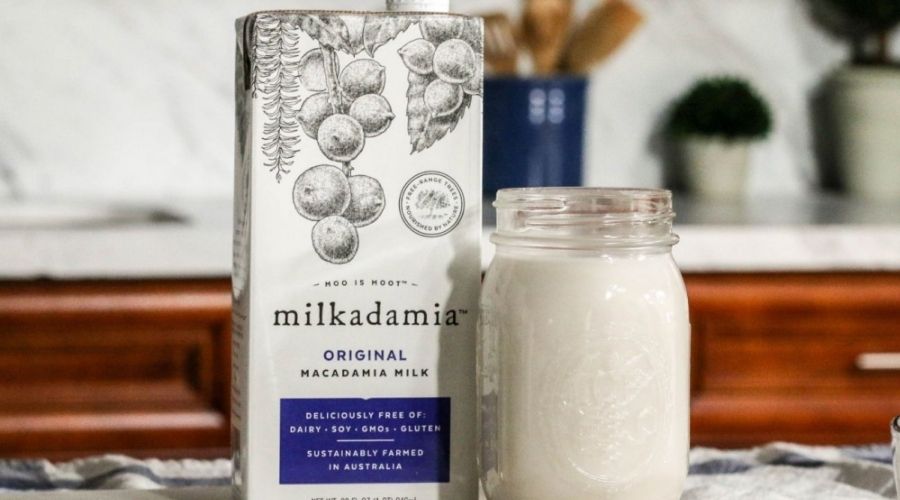
Macadamia milk offers a luxurious, creamy texture with a subtle, buttery flavor, making it a fantastic substitute for dairy in both beverages and recipes requiring richness.
It’s lower in calories and carbohydrates compared to cow’s milk, but higher in healthy fats, making it a good choice for those following low-carb or keto diets.
However, like other nut milks, macadamia milk is low in protein and can trigger nut allergies. Its smooth texture makes it perfect for frothy coffee drinks, rich sauces, or even dairy-free ice cream.
It’s particularly well-suited for recipes where a creamy consistency is desired without overpowering flavors.
Flax Milk
Flax milk is a plant-based milk made from flaxseeds, known for being high in omega-3 fatty acids, which can promote heart health. It’s a low-calorie option and often fortified with essential vitamins and minerals like calcium and vitamin D, making it a nutritious substitute.
Flax milk has a mild, neutral flavor, which allows it to blend well in both sweet and savory recipes.
However, it lacks protein, so it may not be ideal for those looking to boost their protein intake. Flax milk is perfect for smoothies, cereals, and light baking recipes like muffins or pancakes, where a subtle milk replacement is needed.
Quinoa Milk
Quinoa milk is made from the nutrient-dense quinoa grain, making it a gluten-free, protein-rich alternative to dairy. It has a mild, slightly nutty flavor with a hint of sweetness, offering a smooth texture that’s great for both cooking and drinking.
Quinoa milk is a good source of essential amino acids, fiber, and various vitamins, making it a wholesome option.
However, it tends to be more expensive than other non-dairy milks and can have a slightly grainy texture if not processed well. It’s a great choice for breakfast cereals, smoothies, and light soups, where its nutty undertones complement the recipe.
Also Read: 12+ Perfect Guajillo Sauce Substitutes for Every Recipe!
Tiger Nut Milk
Tiger nut milk is a lesser-known but highly nutritious alternative, made from small, tuberous roots called tiger nuts. Despite its name, it’s nut-free, making it safe for those with nut allergies.
Tiger nut milk is naturally sweet and has a creamy, rich texture, similar to cow’s milk. It’s high in fiber, vitamin E, and antioxidants, which promote digestive health and boost immunity.
The downside is that it can be harder to find and might be more costly than other options.
Tiger nut milk is best used in desserts, smoothies, or as a base for creamy sauces, adding a naturally sweet and nutty flavor without overpowering the dish.
Hazelnut Milk
Hazelnut milk offers a distinctive, naturally sweet and nutty flavor, making it a fantastic non-dairy substitute for those who enjoy richer, more robust tastes.
It’s particularly high in vitamin E, which promotes skin health, and contains a decent amount of healthy fats.
However, hazelnut milk is lower in protein compared to dairy milk and may not be the best option for savory dishes because of its strong, sweet flavor.
Hazelnut milk works wonderfully in coffee, hot chocolate, and dessert recipes like cakes, cookies, and even dairy-free ice cream, where its nutty sweetness can enhance the overall flavor profile.
Pistachio Milk
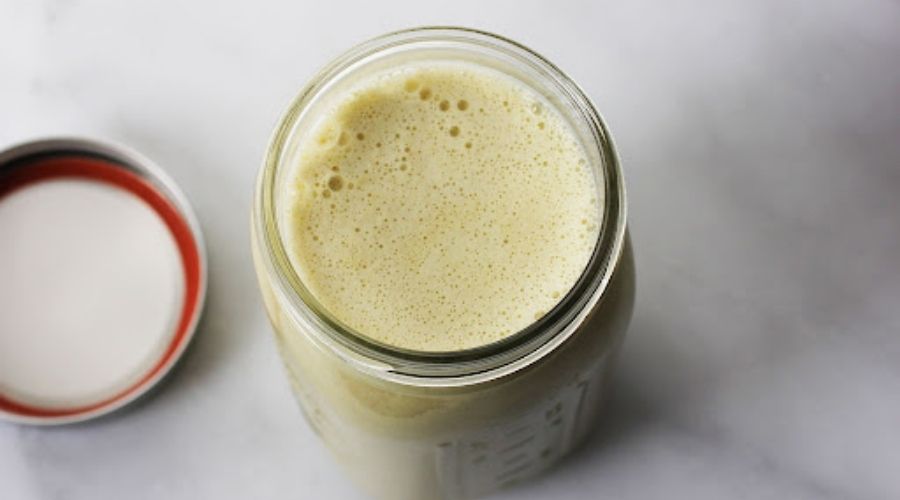
Pistachio milk is a unique, nutrient-dense option with a naturally sweet and slightly savory flavor.
It is rich in antioxidants, healthy fats, and vitamins like B6, which supports immune function. Pistachio milk also has a beautiful, light green color that can add visual appeal to dishes.
While it’s on the pricier side compared to other non-dairy milks, its flavor and creamy texture make it worth considering.
However, it’s low in protein and may not be suitable for those with nut allergies. Pistachio milk is ideal for creamy smoothies, lattes, and desserts, adding both a unique taste and a touch of color.
Banana Milk
Banana milk, made from blended bananas and water, is a naturally sweet and fruit-based alternative to dairy milk. It’s perfect for those looking for a soy-free, nut-free, and gluten-free option.
Banana milk is rich in potassium and offers a natural sweetness without added sugars, making it great for kids and those with a sweet tooth.
However, it has a strong banana flavor, which may not suit all recipes, particularly savory dishes. It also lacks protein and healthy fats compared to other milk alternatives.
Banana milk works best in smoothies, shakes, and baking, where its fruity flavor can complement the other ingredients.
How to Make Non-Dairy Milk Substitute at Home
Making non-dairy milk at home is an easy, affordable, and customizable process.
You can tailor the flavor, thickness, and sweetness to your preference while avoiding any additives or preservatives often found in store-bought versions.
Whether you’re lactose intolerant, vegan, or just seeking a healthier milk alternative, crafting your own non-dairy milk opens the door to endless possibilities.
This recipe focuses on three popular homemade non-dairy milk options: almond milk, oat milk, and coconut milk.
With just a few simple ingredients, you’ll have fresh, delicious milk ready for your daily recipes in no time.
Recipe Ingredients & Instructions
Almond Milk:
- 1 cup raw almonds
- 4 cups filtered water
- Optional: Sweeteners like dates, vanilla extract, or maple syrup
Instructions
- Soak the almonds in water for at least 8 hours or overnight to soften them.
- Drain and rinse the almonds, then add them to a blender with 4 cups of fresh, filtered water.
- Blend on high for 2-3 minutes until the almonds are fully broken down and the water turns milky white.
- Strain the mixture through a nut milk bag or a clean kitchen towel to remove the pulp.
- Optional: Add sweeteners or flavorings like vanilla extract or dates and blend again for a smooth, slightly sweet almond milk.
- Store in a sealed jar in the refrigerator for up to 4-5 days. Shake well before using.
Oat Milk:
- 1 cup rolled oats
- 4 cups water
- Optional: Sweeteners or a pinch of salt
Instructions
- Combine oats and water in a blender. Blend on high for 30 seconds to 1 minute, until smooth.
- Strain the mixture through a fine-mesh strainer or cheesecloth, being careful not to overstrain (to avoid sliminess).
- Optional: Add a pinch of salt or natural sweeteners like maple syrup for added flavor.
- Store the oat milk in a sealed container in the fridge for up to 4 days. Shake before each use.
Coconut Milk:
- 1 cup shredded unsweetened coconut
- 4 cups hot water
Instructions
- Place the shredded coconut and hot water in a blender. Blend on high for about 2-3 minutes until fully combined.
- Strain the coconut mixture through a nut milk bag or fine-mesh strainer into a bowl.
- Press the coconut pulp to extract as much liquid as possible.
- Store the coconut milk in an airtight jar in the refrigerator for up to 5 days. Shake well before using as the fat may separate.
Homemade non-dairy milk is not only easy to make but also far more customizable than store-bought versions.
With just a handful of ingredients, you can create fresh, delicious almond, oat, or coconut milk right in your kitchen, free from preservatives and added sugars.
Whether you’re looking for a creamy addition to your coffee, a nutrient-packed base for smoothies, or a healthy alternative for baking, homemade non-dairy milk offers the perfect solution.
Plus, you can experiment with flavors, sweetness, and thickness to suit your preferences. Enjoy the satisfaction of crafting your own dairy-free milk substitutes tailored to your tastes!
What is the best non-dairy milk substitute for coffee?
The best non-dairy milk substitute for coffee is oat milk. It has a creamy texture that froths well, making it ideal for lattes and cappuccinos.
Its naturally sweet flavor balances the bitterness of coffee, and it’s less likely to curdle when mixed with hot beverages compared to almond or soy milk.
Barista versions of oat milk are especially designed for coffee, offering a rich and smooth finish.
Which non-dairy milk is the healthiest?
The healthiest non-dairy milk depends on your dietary needs. Almond milk is low in calories and fat, making it great for weight-conscious individuals.
Soy milk is rich in protein and comparable to cow’s milk in nutritional value, making it a great all-around choice.
Hemp milk is also nutrient-dense, providing omega-3 and omega-6 fatty acids, which promote heart health. Ultimately, the best option is one that meets your personal health goals and tastes.
Can non-dairy milk be used in baking?
Yes, non-dairy milk substitutes like almond milk, soy milk, oat milk, and coconut milk work well in baking. These alternatives can replace dairy milk in a 1:1 ratio in most recipes.
Soy and almond milk are good for cakes, muffins, and cookies due to their neutral flavors, while coconut milk adds richness and moisture to desserts like pies and custards.
Just be mindful of the flavor differences, as some may alter the taste slightly.
What non-dairy milk has the most protein?
Soy milk is the best non-dairy milk substitute in terms of protein content, offering about 7-8 grams of protein per cup, which is similar to cow’s milk.
Pea milk also provides a substantial amount of protein, around 8 grams per cup, making it another great option for those looking to boost their protein intake. Other non-dairy milks, like almond or rice milk, are much lower in protein.
Which non-dairy milk is best for people with nut allergies?
If you have a nut allergy, oat milk, rice milk, and hemp milk are excellent non-dairy substitutes as they are free from tree nuts.
Oat milk has a creamy consistency that works well in coffee, baking, and cooking, while rice milk is lighter and sweeter, perfect for cereals or smoothies.
Hemp milk, on the other hand, offers a nutritious option packed with healthy fats and works well in savory dishes. Always check labels to ensure no cross-contamination with nuts.
References
- https://www.healthline.com/nutrition/best-milk-substitutes
- https://www.foodnetwork.com/recipes/packages/baking-guide/the-best-milk-alternative-for-baking
- https://www.bonappetit.com/story/the-best-new-nondairy-milks
- https://www.realsimple.com/food-recipes/shopping-storing/beverages/non-dairy-milk
- https://www.pacificfoods.com/blog/milk-substitutes-cooking/

